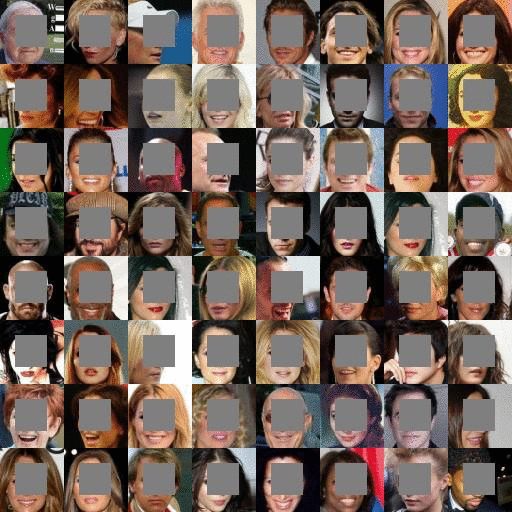The network has been trained on 80% of the celebA dataset and the faces used for completion have been randomly sampled from the remaining 20%.
This repository aims to implement Raymond Yeh and Chen Chen et al.'s paper Semantic Image Inpainting with Perceptual and Contextual Losses. It is done with the Torch framework and is based on Soumith's DCGAN implementation https://github.com/soumith/dcgan.torch.
-
Install
torch: http://torch.ch/docs/getting-started.html -
Choose a dataset and create a folder with its name (ex:
mkdir celebA). Inside this folder create a folderimagescontaining your images.
Note: for thecelebAdataset, run
DATA_ROOT=celebA th data/crop_celebA.lua
- Train a DCGAN model in order to obtain a discriminator and a generator networks. I have already trained the model on the celebA dataset and put the corresponding networks into the
checkpointsfolder. If you want to train it again or use a different dataset run
DATA_ROOT=<dataset_folder> name=<whatever_name_you_want> th main.lua
- Complete your images. You may want to choose another dataset to avoid completing images you used for training.
DATA_ROOT=<dataset_folder> name=<whatever_name_you_want> net=<prefix_of_net_in_checkpoints> th inpainting.lua
Example:
DATA_ROOT=celebA noise=normal net=celebA-normal name=inpainting-celebA display=2929 th inpainting.lua
If you want, install the display package (luarocks install display) and run
th -ldisplay.start <PORT_NUMBER> 0.0.0.0
to launch a server on the port you chose. You can access it in your browser with the url http://localhost:PORT_NUMBER.
To train your network or for completion add the variable display=<PORT_NUMBER> to the list of options.
In your command line instructions you can specify several parameters (for example the display port number), here are some of them:
noisewhich can be eitheruniformornormalindicates the prior distribution from which the samples are generatedbatchSizeis the size of the batch used for training or the number of images to reconstructnameis the name you want to use to save your networks or the generated imagesgpuspecifies if the computations are done on the GPU or not. Set it to 0 to use the CPU (not recommended, see below) and to n to use the nth GPU you have (1 is the default value)lris the learning rateloadSizeis the size to use to scale the images. 0 means no rescale
It is highly recommended to do the computations on the GPU since it will be much faster. However I provided networks that can be used without gpu in the checkpoints/ folder (the ones with "float" in their name).
